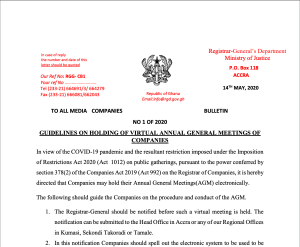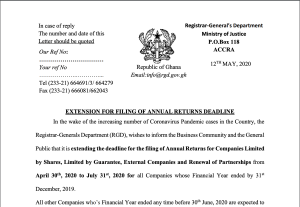Introduction
Corporate governance plays a pivotal role in shaping the ethical framework and operational efficiency of businesses, ensuring transparency, accountability, and responsible decision-making. In Ghana, the landscape of corporate governance has undergone significant transformation in recent years, reflecting the nation’s commitment to fostering a conducive business environment. This article delves into the key aspects of corporate governance in Ghana, exploring the regulatory landscape, best practices, and the impact on businesses.
Regulatory Framework
Ghana has made commendable strides in establishing a robust regulatory framework for corporate governance. The Securities and Exchange Commission (SEC) and the Ghana Stock Exchange (GSE) are at the forefront of overseeing and regulating corporate governance practices in the country. The SEC’s Corporate Governance Code, last updated in 2018, serves as a comprehensive guideline for companies to adhere to best practices.
Key Principles of Corporate Governance:
Board Structure and Composition
The corporate governance framework in Ghana emphasizes the importance of a balanced and diverse board. Companies are encouraged to appoint directors with a mix of skills, experiences, and backgrounds to ensure effective decision-making and risk management.
Transparency and Disclosure
Transparency is a cornerstone of corporate governance in Ghana. Companies are required to provide clear and accurate information to stakeholders, including financial reports, operational updates, and potential risks. Timely and comprehensive disclosure is crucial for maintaining trust among shareholders and the wider public.
Ethical Conduct and Accountability:
Ethical behavior is strongly emphasized in Ghana’s corporate governance principles. Directors and executives are expected to uphold the highest standards of integrity and accountability. Companies are encouraged to establish and maintain a strong ethical culture, fostering a sense of responsibility among employees.
Shareholder Rights:
Protecting shareholder rights is paramount in Ghana’s corporate governance landscape. Companies are obligated to respect and safeguard the rights of shareholders, providing them with relevant information and ensuring their participation in key decision-making processes, such as annual general meetings.
Risk Management and Internal Controls:
Robust risk management and internal control systems are integral components of corporate governance in Ghana. Companies are required to implement effective mechanisms for identifying, assessing, and managing risks to safeguard the interests of stakeholders.
Challenges and Opportunities:
While Ghana has made significant progress in strengthening corporate governance, challenges persist. Enforcement of regulations, especially among smaller companies, can be a concern. Additionally, there is a need for continuous education and awareness campaigns to ensure widespread understanding and compliance with corporate governance standards.
However, the evolving corporate governance landscape also presents opportunities for businesses in Ghana. Companies that prioritize ethical conduct and sustainability are likely to attract investors and build long-term relationships with stakeholders, contributing to the overall economic development of the nation.
Conclusion:
Corporate governance in Ghana is an evolving framework that seeks to foster responsible business practices, transparency, and accountability. The commitment to improving governance standards is evident in the regulatory initiatives undertaken by institutions such as the SEC and GSE. As businesses in Ghana continue to navigate the complexities of the global marketplace, a strong foundation of corporate governance will play a crucial role in ensuring sustainable and ethical business practices.


